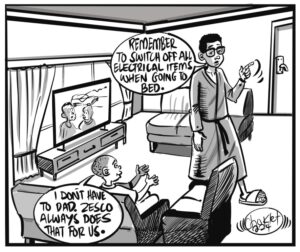University of Zambia public relations manager Damaseke Chibale says the institution was not established for the vulnerable.
And Chibale says the allocation of part of the ‘Ruins’ to female students is a good decision aimed at training and bringing up morally responsible students.
Justifying management’s decision to hike accommodation and other fees when he featured on UNZA Radio’s Lusaka Star programme yesterday, Chibale said people needed to remove the misconception that UNZA was pro poor.
“We have to remove this perception that the University of Zambia is a unique university full of vulnerable students. It is not a pro poor. When this university was established, it was established for all Zambians irrespective of whether you are poor or rich, you must have an equal right and access to study at the university. So it was not established for the vulnerable,” Chibale said.
He said management could not continue subsidising students’ accommodation costs.
“To run accommodation here at UNZA, we are looking at water bills, electricity bills, maintenance and repair costs, solid waste, cleaning services, these are always going up and when we look at the cost per month, it is about K1.27 million which means that per annum, we are spending about K15 million and previously, you were paying about K1,200 per annum. This translates into about K4.6 million, that is the contribution that the students were making towards accommodation. So if you compare K4.6 million to K15.2 million, it means the University of Zambia was subsidizing for your accommodation cost for about K10.2 million. So how’s going to pay that difference of K10.2 million? The money that we were supposed to do other things, we had to channel it to doing that but that is not sustainable so we have to look at the real cost of accommodation…even this increment is so low,” he said.
Chibale further justified the increase in fees saying UNZA needed the funds to survive.
“We are looking at the cost of how we can provide services that the university offers to the students like accommodation, Internet, examinations and many others in a realistic sense and meet the operation costs of such services. If these services are disputed, the life of a student at UNZA will not be the same, it will be difficult. UNZA has three sources of income: government grant which is 24 or 28 per cent, then about 65 per cent is what we get from the tuition, then just about three percent is what we get from other businesses that the university has. That shows that our business portfolio is very low. We are a public institution, we cannot aggressively get involved in business because our core business is teaching, research and community service. Other universities in the world run their universities based on tuition fees because that is their only source of revenue,” he said.
“In private universities, 90 per cent of their source of income is tuition fees and the other per cent is what they can do from business activities. At the end of the day, students are the ones who benefit from the money which they pay because it is the same money that we use for accommodation, teaching services, researches, paying lecturers, bringing in outside examiners, pay for electricity, water and medical services to buy drugs and pay staff that are working in the clinic. It is from this perspective that we cannot continue to remain at the rates that we were 10 years ago because it will not make businesses.”
He however said UNZA was alive to the fact that some students were vulnerable.
“We as the University of Zambia are very much alive to the fact that there are some students who are indeed vulnerable and the university has put in place measures to ensure that the vulnerable students are taken care of. For example we have the so called rural affirmative policy which allows children coming from poor rural areas without access to modern facilities that the urban areas have. Some of these students are accepted at the university even if they have the lowest points because we want to live up to our name as a national university. We also have a gender policy which allows 30 percent of the spaces available at the university to be given to the female applicants and then the 70 percent is competed [for] by both the female and male applicants,” Chibale said.
“All these aspects show that as the university, we are very much alive to some of the challenges our people are facing. Government also has put in place facilities and departments that are looking at vulnerable children. You and me are not qualified to call someone vulnerable. We have people at government departments that are qualified to say this person is indeed vulnerable and they give us such reports. So to give a blanket label that UNZA is a pro poor institution is a misconception and a misunderstanding which must be corrected.”
Meanwhile, Chibale said letting female students share the formerly exclusively male hostels commonly known as Ruins would train male students to be gentlemen.
“The rearrangement of the accommodation, I don’t know what pictures people have? This is not strange. We have a good example of a new residence. What happens at the new residence? Are you telling us that there is so much immorality in the new residence? No. We have respectable students there, morally responsible students and what about the old residence? What is so special about that? You are the same students so what is so different? So for us, as far as we are concerned, this is a right decision and those misconception and mental pictures that people have is not there. So the most important thing is that we are looking at training and bringing up morally responsible students that will contribute to the well being of our society. We must also realize that females will be part of us, we have our mothers, sisters, we stay with them in the same homes which is the same as what is going to happen to the old residence,” said Chibale.
“It is not that you are going to share rooms with them. They will have their own rooms and demarcated blocks. The male students will also have their own demarcated areas. We are trying to balance and ensure that our students realize that in society they will live with women. They must realize that they are actually partners with the females in everything that they do as they grow up. They should learn from here how to take care of our female friends because they will work with them…you should learn from here how to take care of our female friends and how to be a gentleman that you should be and not to develop certain behaviours that are unbecoming and not suitable for a student that is studying at this level, university education.”












